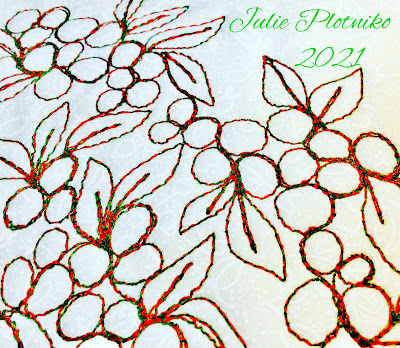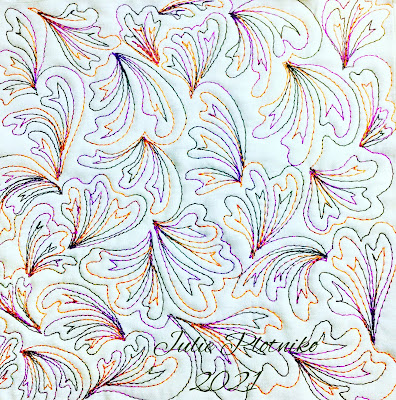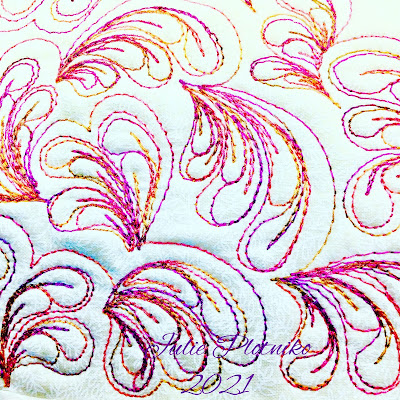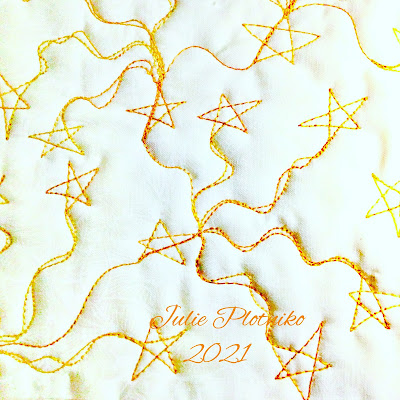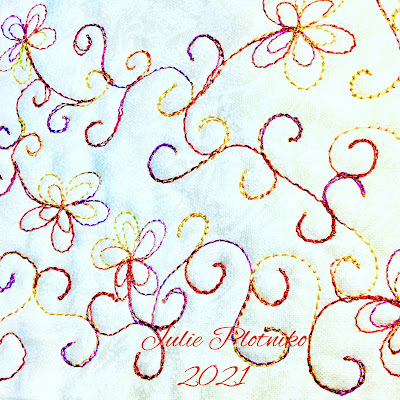 |
| A Collection of Charm Packs |
A charm Pack is a collection of 5” squares containing at
least one square from each fabric in a line or grouping.
I absolutely love Charm Packs and have to admit to having a
rather large collection of them.
They are pretty,
easy to carry (making them a great treat when I’m traveling) and always seem to
want to follow me home from the quilt store.
If you are anything like me then you probably have multiple
Charm Packs waiting to be sewn so I’ve posted a new Charm Square pattern for
you on my Free Pattern Page but first, to understand the origin of the Charm
Pack we must look at a brief history of the Charm Quilt.
What is a Charm Quilt?
The accepted definition of a charm quilt is a one patch
quilt that uses a different fabric for each patch with no two the same.
Hexagons, Pyramids, Apple Core, Squares, Half Square
Triangles and Tumbler (or Thimble) are just a few of the many traditional One
Patch Quilts.
This style of quilting seemed to originate around 1870 and
remained popular to around 1900 with a short resurgence in the 1930’s.
As fabric was expensive and not abundantly available during
these time periods it is widely considered that quiltmakers of the time would
trade pieces of fabric (or beg friends for scraps) in order to have the variety
needed to make a charm quilt. This led
to these quilts also being referred to as Beggars Quilts.
 |
| 1870 Charm Quilt with 3700 pieces |
This quilt was made in 1870 in Decatur Illinois and contains 3700 pieces, each one a different fabric.Photo courtesy of Vintage Blessings
 |
| A Miniature Charm Quilt 1980s, made by author. |
The Birth of the Modern Charm Square
 |
| A Group of Coordinating Charm Squares |
This is where I come in.
With the resurgence of quilting in the 1980s and ’90s came
an abundance of quality quilting fabrics and a renewed interest in making charm
quilts.
With the invention of the rotary cutter, we began to strip-cut our fabrics, making cutting small pieces easier and more accurate.
Quilters began purchasing a little extra every time they
bought fabric to cut into squares to trade.
As the average fabric width was 42” and we didn’t need large
pieces for our modern charm quilts it quickly became the norm to cut a five inch strip
and divide it into five inch squares. We chose five inches as this was the
measurement that gave us a square large enough to be useful with very little leftover at the end of the strip.
A five inch strip of fabric gave us eight squares, one to keep and
seven to trade.
Trading five-inch squares was so much fun that Guilds and
groups held regular square swaps. There was mail in swaps, friendship swaps,
birthday swaps and specialty swaps for flower quilts, I Spy quilts, children’s
fabric and more.
We were smitten with 5” squares and began to create a wide variety
of patterns to use our ever-increasing collections. These patterns often have the
addition of sashing, borders and background fabric so they don’t fall under the
strict definition of a charm quilt but that’s OK.
Even the antique charm quilts often break the rules. It’s part of the fun of being a quilter!
We sometimes called these quilts as Nickel Quilts
referring to Nickel Squares, another one of the nicknames for five-inch squares.
Over time,, five-inch squares proved so popular that
some quilt shops began to cut bundles for their customers to purchase.
In 2006 Moda-Fabrics introduced the first mass-produced pre-cut bundles at International Quilt Market in the form of 42, 2 ½” strips
rolled into what quickly became known as a Jelly Roll.
These bundles contained 42 strips as that was the number of
fabrics in the line. As a result, 42 strips in a roll remains the norm.
I’ll share more about the 2 ½” strip in a future
post.
Other fabric companies quickly followed with strip sets of
their own all with fanciful names.
With the popularity of the 2 ½” strip sets and ever-improving technology, fabric companies quickly added the 5” Charm Pack to their
available pre-cut fabrics.
These fabrics are die-cut at the same time as the lines of
fabric are printed so it is super simple to make a quilt that appears both
scrappy and coordinated at the same time.
They are a great time saver for the busy quilter and offer easy
success for those who are learning to quilt.
The number of squares in a charm pack varies with the
manufacturer and line of fabric though the average remains 42.
 |
| A Simple Quilt Made of Charm Squares |
But Why Are They Called Charm Squares?
The obvious would be that they are all one shape with only
one piece of each fabric but there’s more.
Charms or amulets have been worn throughout history and are
believed to have magical properties such as the ability to ward off evil or
bring good luck.
The charm bracelet as we know it was popularized by Queen
Victoria during her reign (1837 – 1901).
Each charm attached to these bracelets had individual
meaning to the wearer and was often the gift of a friend or loved one.
From around 1860 to 1900 young ladies would also trade
buttons to make Button Charm Strings. Buttons were to be gifted or traded (not purchased) as to receive the gift of a button, like most "charms", was considered good luck.
It seems reasonable to conclude then that quilters of the era found their inspiration in both Charm Bracelets and Button Charm Strings as the first recorded "Charm Quilts" are from the same time period (1870 to 1900).
 |
| My Charm Bracelet |
During the 1980s and 1990s as quilting gained in popularity, charm bracelets were once again, right there too.
Charms
were affordable with hundreds to choose from making them a nice gift to give or
receive. During this time
period, Charm Bracelets also became known as Friendship Bracelets.
Through the
practice of trading our five-inch squares, they were also known for a short time
as friendship squares.
As quilting cotton became more plentiful, making true charm quilts enjoyed another brief resurgence.
When we began purchasing coordinated groups of squares that
we could use to make Charm Quilts they just naturally became “Charm Squares”.
Of course, as our collections grew and grew, creative
quilters have created an endless variety of patterns to use these once humble
Charm Squares.
Now it’s time to go to the Free Pattern Page to get your Free Charming Geese pattern
and start sewing!
Though not a true Charm Quilt, Charming Geese is made from just one Charm Pack and equal amounts of background and border fabric.
 |
| Charming Geese Lap Quilt |
Remember to post pictures of the quilts you make from
this pattern in the comments section.
Extra, extra, read all about it!
This post has been so popular that I thought it was time for an update.
As I've added lots more photos, I felt it was time that you had another, free pattern.
"Prints Charming" is a true Charm quilt as it's entirely pieced from a single shape, each one a different fabric.
The Tumbler shapes are cut from Charm Squares so you can make this quilt from a variety of Charm Packs or have fun trading 5" squares with your friends.
The full instructions can be found on the Free Pattern Page under the Tab at the top of this page.
 |
| Charming Tumbler Quilt |
